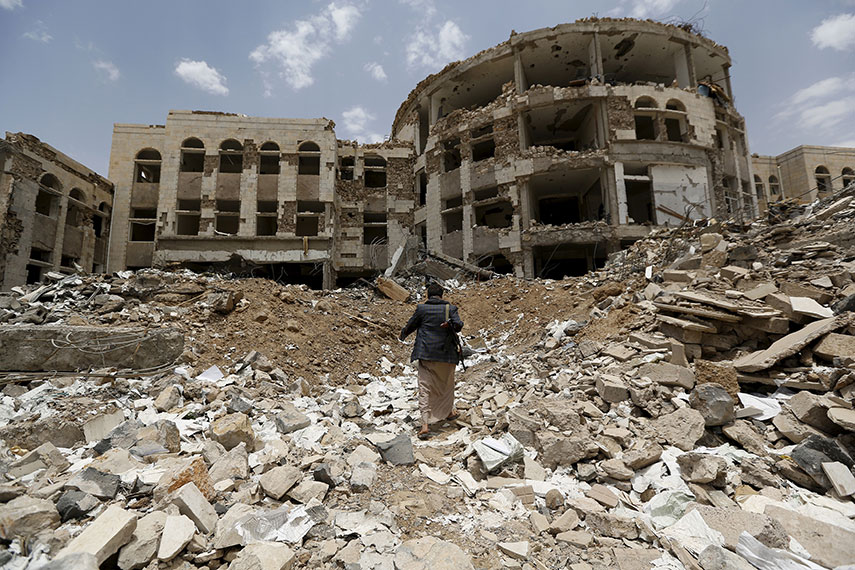RIYADH: The Riyadh-led military coalition fighting Yemen’s Huthi rebels has declared a two-week ceasefire in the country starting Thursday in a bid to combat the spread of the deadly coronavirus.
The unilateral ceasefire follows an escalation in fighting between the warring parties despite a call by the United Nations for an immediate cessation to protect civilians in the Arab world’s poorest nation from the pandemic.
The announcement, due to take effect from 0900 GMT Thursday, marks the first breakthrough since the warring parties agreed to a UN-brokered ceasefire in the port city of Hodeida during talks in Sweden in late 2018.
“The coalition announces a comprehensive ceasefire in Yemen for a period of two weeks, starting on Thursday,“ Turki al-Maliki, the military alliance’s spokesman, said on Wednesday.
The two-week period, which could be extended, was aimed at creating “appropriate conditions” for a UN-sponsored meeting between the warring parties to facilitate a “permanent ceasefire” in Yemen, Maliki added.
There was no immediate reaction from the Iran-aligned rebels.
But hours before the announcement, the rebels released a comprehensive vision to faciliate dialogue, which called for a withdrawal of foreign troops and the end of the coalition’s blockade on Yemen’s land, sea and air ports.
The coalition, which launched its intervention to oust the rebels in 2015, was committed to a two-week ceasefire but still reserved the right to defend itself if it came under attack, Saudi officials said.
UN special envoy Martin Griffiths welcomed the coalition’s announcement.
“The parties must now utilise this opportunity and cease immediately all hostilities with the utmost urgency, and make progress towards comprehensive and sustainable peace,“ Griffiths said.
Saudi deputy defence minister Prince Khalid bin Salman also called on the rebels to “show good will” and engage in dialogue.
“The two week ceasefire will hopefully create a more effective climate to deescalate tensions, work with (Griffiths) towards a sustainable political settlement,“ Prince Khalid said on Twitter.
‘Litmus test’
The United Nations has repeatedly called for an immediate cessation of hostilities in Yemen to help avert potentially disastrous consequences of the coronavirus outbreak.
Yemen’s broken healthcare system has so far recorded no cases of the COVID-19 illness, but aid groups have warned that when it does hit, the impact will be catastrophic.
The country is already gripped by what the UN calls the world’s worst humanitarian crisis.
“The ceasefire seems to be more of a courtesy than a policy -- it comes in response to UN calls to deescalate during the COVID-19 crisis,“ Fatima Abo Alasrar, a scholar at the Middle East Institute, told AFP.
Saudi Arabia, the Yemeni government and the Huthi rebels had all welcomed an appeal from UN Secretary General Antonio Guterres for an “immediate global ceasefire” to help avert disaster for vulnerable people in conflict zones.
“It is most important to watch if the Huthis will stop their military operations,“ Alasrar said.
“That will be the real litmus test of a successful ceasefire as the Huthis have currently opened multiple battlefronts they cannot afford to close.”
Fighting recently escalated again between the Huthis and Riyadh-backed Yemeni troops around the strategic northern districts of Al-Jouf and Marib, ending a months-long lull.
And Saudi air defences intercepted Yemeni rebel missiles over Riyadh and the border city of Jizan late last month, leaving two civilians wounded in the curfew-locked capital, state media reported.
It was the first major assault on Saudi Arabia since the Huthi rebels offered last September to halt attacks on the kingdom after devastating assaults on Saudi oil installations.
Last week, the coalition carried out multiple air strikes on Yemen’s rebel-held capital Sanaa in retaliation for the missile strikes. - AFP













